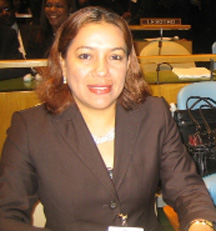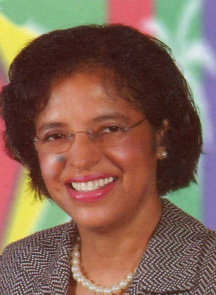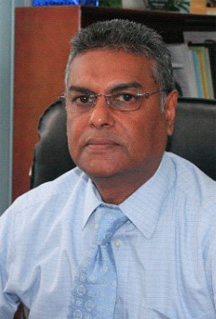The National Assembly yesterday unanimously passed an amendment that will see free movement in the region for more categories of skilled labour, even as government members tried to defend the PPP/C’s record in office after criticism over the migration of skills.
Foreign Affairs Minister Carolyn Rodrigues-Birkett piloted the bill through the House and said that it “represented one additional but important step being taken by the government to meet its obligations under the revised Treaty of Chaguaramas and more particularly the CARICOM Single Market and Economy (CSME) in relation to free movement of people.”
The Caribbean Community (Free Entry of Skilled Nationals) (Amendment) Bill 2011 will see the widening of the categories of ‘skilled nationals’ eligible for a “Schedule II Certificate,” commonly called a “CSME certificate,” which allows persons to travel to other countries and to seek employment without a work permit. The amendment proposed that university graduates, media workers, musicians, artistes, sports persons, teachers, registered nurses, persons holding associate degrees, artisans possessing a Caribbean vocational qualification or an approved vocational qualification and domestics who have obtained a Caribbean vocational qualification would be eligible for a Schedule II Certificate.

According to Rodrigues-Birkett, while the amendment could be seen as a simple one, it reflected the PPP/C’s commitment to fulfilling legislative obligations under the Free Movement Regime. She said that in passing the legislation Guyana would be the first territory in the region to be comprehensively in line with the requirements.
She noted that from 1997 to 2011, a total of 3,301 certificates have been granted to Guyanese nationals. “Of this amount, 2,404 are graduates with university degrees, 124 trained teachers, 35 registered nurses, 65 musicians, 142 artistes, 43 media workers, 88 sports persons, 400 persons with associated degrees and equivalent, and 25 to other nationals from the Caribbean Community,” she said. She said that it was necessary to amend the law to reflect these additional groups of skilled nationals.
‘One way’
PNCR-1G Shadow Foreign Affairs Minister Clarissa Riehl, who was the lone opposition speaker on the bill, said that her party supported the bill based on the premise that freedom of movement was key to any integration movement. She, however, expressed concerned at the slow progress being made in this area.

Speaking specifically about Guyana, Riehl contended that the “free movement” of skills in the region only saw Guyanese leaving the country. “How many CARICOM nationals come here seeking employment? The figure must be miniscule indeed,” she said. “The traffic flows in the opposite direction, with Guyanese going to other CARICOM countries,” she stated.
Riehl proceeded to give reasons why she felt this was the case. “That is the reality, people are not coming here because we do not have the necessary jobs to offer them, that would pay them and worth their while to come here. Secondly, sir, there is the horrendous crime rate here in Guyana, which is a major detriment to foreigners wanting to live in our midst. And, thirdly, sir, there are simply not jobs available here,” she said clearly upsetting some government members.
“The free movement of skills doesn’t necessary mean just one way out of Guyana, our dilemma is the free movement is always out of Guyana,” Riehl lamented. “Are we doomed to be constantly replenishing these skills? Putting our teachers and nurses on bonds? Bonding our teachers and nurses after training them is not the answer” she said, noting that both these categories are now on the expanded list. To solve this problem, Riehl said, was to put value to the dollar and to try to cut the cost of living. “We have to cut our cost of living, which will encourage, not only, one way traffic but traffic to Guyana as well as from,” she said. Riehl said that production and productivity were key to improving value of the dollar.
‘Vision’
Labour Minister Manzoor Nadir criticised Riehl for her statements and said that “Guyana always provided leadership to the integration movement in the Caribbean.” In his attempt to refute some of her remarks, Nadir said that when he attended a regional gathering of labour ministers, Guyana was saluted for its most impressive growth rate of Gross Domestic Product (GDP) and for the fact that it had the lowest unemployment rate in the entire Caribbean.

“While we may be $202 to US$1, it has been $202 to US$1 for over a decade,” Nadir said, to the desk thumping support of members of the government benches. He noted that the exchange rates in other countries were often deceptive and did not truly indicate the entire economic well-being of a territory. He said too that the cost of living in Guyana was not more expensive than in other Caribbean territories.
Meanwhile, Nadir said that all was not perfect in Guyana. “We’re not living in paradise…we know that we have 75,000 very, very poor people living in this country…but, we have been providing vision and leadership to the integration movement,” he stated.
Speaking specifically about the bill, Nadir noted that it addressed the category of workers who did domestic work and said that it brought formality to a “very, very vulnerable group.”
Meanwhile Rodrigues-Birkett, in wrapping up the debate, said that foreigners were coming to Guyana all the time and she identified several regional companies which had offices here.
Rodrigues-Birkett said that it was necessary for the government “to think outside of the box” to see how it could benefit from the skills of its people, but said that it is a reality that people will always move. “Let us don’t fool ourselves. People are moving throughout the world…,” she noted. “People are going to move and this is why this amendment that we bringing here today is to make sure that this movement is done in a very formalised way, in a way that our people would not be exploited one way or the other,” she said.
Under the existing legislation, persons with degrees from either the University of Guyana, the University of the West Indies or University of Suriname as well as any other comparable university degree may qualify for a certificate. Persons with qualifications certified by the Secretary-General of CARICOM and the Minister may also qualify.
Schedule I of the Principal Act, which gives the qualifying Caribbean Community States, will also be amended, with the only change being the inclusion of The Bahamas in the list, bringing the total up to 14 countries.
Meanwhile, the House unanimously passed a motion to ratify an agreement signed in July, 2008 to replace the Caribbean Disaster Emergency Response Agency (CDERA) with the Caribbean Disaster Emergency Management Agency (CDEMA). CDEMA is tasked with “mobilising and coordinating disaster relief, mitigating or eliminating the immediate consequences of disasters and providing immediate and coordinated response by means of emergency disaster relief to any affected Participating State.”





